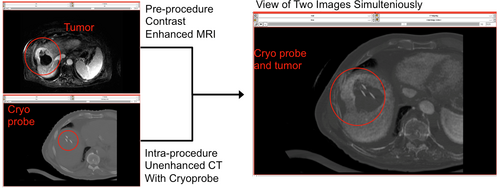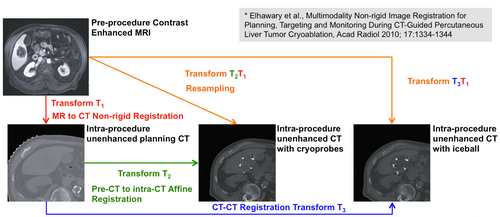Difference between revisions of "Non-rigid MR-CT Image Registration"
| Line 1: | Line 1: | ||
[[Image:nonrigid.png |NON-RIGID MR-CT IMAGE REGISTRATION: This tutorial demonstrates how to perform MR-CT and CT-CT non-rigid registrations. In a cryoablation of liver case, we can see a tumor on pre-operated MRI. However, on intra-operated CT image, the tumor can not be seen though cryoproves can be seen. By using non-rigid MR-CT image registration, we can check the distance between the cryoprobes and tumor as shown the figure. |500px|thumb|right]] | [[Image:nonrigid.png |NON-RIGID MR-CT IMAGE REGISTRATION: This tutorial demonstrates how to perform MR-CT and CT-CT non-rigid registrations. In a cryoablation of liver case, we can see a tumor on pre-operated MRI. However, on intra-operated CT image, the tumor can not be seen though cryoproves can be seen. By using non-rigid MR-CT image registration, we can check the distance between the cryoprobes and tumor as shown the figure. |500px|thumb|right]] | ||
| − | [[Image:nonrigid-cryo.png |Registration between MR and CT images in cryoablation of a liver case. (1) A transformation matrix T1 was used to deform the pre-procedure contrast enhanced MR image on to the planning CT image. (2) T2 was used to deform the planning CT image on to the intra procedure CT image with cryoprobes. (3) The matrix T2 was combined with T1 to deform the MR image onto the CT image with cryoprobe. |500px|thumb|right]] | + | [[Image:nonrigid-cryo.png |PROCESS OF IMAGE REGISTRATION IN CRYOABLATION OF LIVER CASE: Registration between MR and CT images in cryoablation of a liver case. (1) A transformation matrix T1 was used to deform the pre-procedure contrast enhanced MR image on to the planning CT image. (2) T2 was used to deform the planning CT image on to the intra procedure CT image with cryoprobes. (3) The matrix T2 was combined with T1 to deform the MR image onto the CT image with cryoprobe. |500px|thumb|right]] |
= Non-rigid MR-CT Image Registration Tutorial= | = Non-rigid MR-CT Image Registration Tutorial= | ||
Revision as of 22:21, 3 June 2011
Home < Non-rigid MR-CT Image Registration

Contents
Non-rigid MR-CT Image Registration Tutorial
Overview
Shape analysis has become of increasing interest to the medical community due to its potential to precisely locate morphological changes between healthy and pathological structures. SPHARM-PDM is a tool that computes point-based models using a parametric boundary description for the computing of Shape analysis. The point-based models computed with the SPHARM-PDM tool can be used in combination with the also UNC designed statistical tool shapeAnalysisMANCOVA to perform quantitative morphological assessment of structural changes at specific locations.
- Step by step analysis: With the ShapeAnalysisModule tutorial,you will learn how to load input volumes, run the module to generate triangulated surfaces with inherent correspondences and visualize them thanks to an intuitive quality control. Indeed,compared with previous versions, the ParticleModule is now part of ShapeAnaysisModule.
Tutorials
Non-rigid MR-CT Image Registration Module tutorial : to perform MR-CT and CT-CT image registration [ppt] [pdf]
Tutorial materials
ShapeAnalysisModule data :
- Link to NITRC
- or directly here : ShapeAnalysisModuleTutorialData_TutorialContestSummer2011.zip
People
Atsushi Yamada
Dominik S. Meier
Nobuhiko Hata